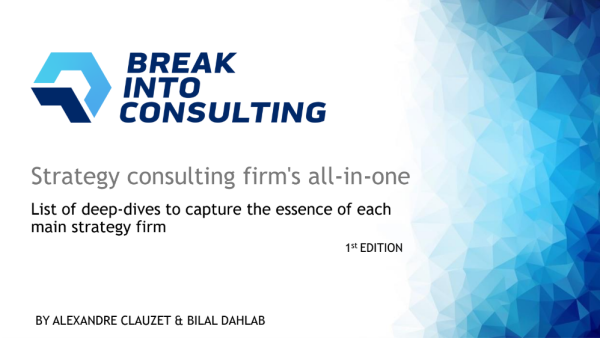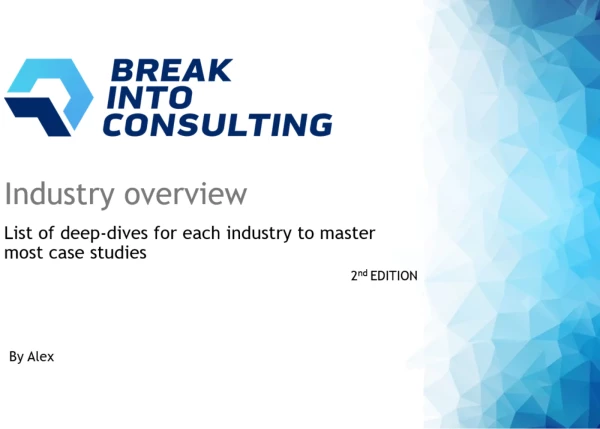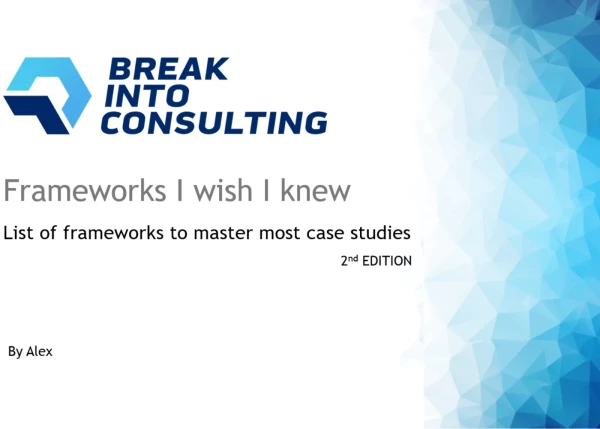How can I improve my mental maths skills?
Overview of answers
Hi,
I would be happy to share few insights on how to better tackle mental maths BUT you should take into account that it should be your last priority in preparation. MBB focuses on accurate calculations and interpretation of graphs vs speed of calculations.
So let's get on to the practice:
The "9-trick"
To add 9 to any number, first add 10, and then subtract 1. For example, we change the addition 9 + 4 to 10 + 3, which is much easier to solve.
But this "trick" expands. Can you think of an easy way to add 73 + 99? Change it to 72 + 100. How about 485 + 999?
How would you add 39 + 27 in your head? Let 39 become 40… which reduces 27 to 26. The addition is now 40 + 26.
Doubles + 1
Memorize the doubles from 1 + 1 through 9 + 9. After that, a whole lot of other addition facts are at their fingertips: the ones we can term "doubles plus one more". For example, 5 + 6 is just one more than 5 + 5, or 9 + 8 is just one more than 8 + 8.
Use addition facts when adding bigger numbers. Once you know that 7 + 8 = 15, then you will also be able to do all these additions in your head:
◦ 70 + 80 is 15 tens, or 150
◦ 700 + 800 is 15 hundreds, or 1500
Subtract by adding
This is a very important principle, based on the connection between addition and subtraction. You really don't need to memorize subtraction facts as such, if you can use this principle. For example, to find 9 − 6, think, "6 plus what number makes 9?" In other words, think of the missing number addition 6 + ___ = 9. The answer to that is also the answer to 8 − 6.
This principle comes in especially handy with subtractions such as 13 − 7, 17 − 8, 16 − 9, and other basic subtraction facts where the minuend is between 10 and 20. But you can also use it in multitudes of other situations. For example, 63 − 52 is easier to solve by thinking of addition: 52 + 11 makes 63, so the answer to 63 − 52 is 11.
Five times a number
To find 5 times any number, first multiply that number times ten, then take half of that. For example, 5 × 48 can be found by multiplying 10 × 48 = 480, and taking half of the result, which gives us 240.
Four and eight times a number
If you can double numbers, you already have this down pat! To find four times a number, double that number twice. For example, what is 4 × 59? First find double 59, which is 118. Then double that, and you get 236.
Similarly, eight times a number just means doubling three times. As an example, to find 8 × 35 means doubling 35 to get 70, doubling 70 to get 140, and (once more) doubling 140 to get 280. However, personally I would transform 8 × 35 into 4 × 70 (you double one factor and halve the other), which is easy to solve to be 280.
Multiply in parts
This strategy is very simple, and in fact it is the foundation for the standard multiplication algorithm. You can find 3 × 74 mentally by multiplying 3 × 70 and 3 × 4, and adding the results. We get 210 + 12 = 222. Another example: 6 × 218 is 6 × 200 and 6 × 10 and 6 × 8, which is 1200 + 60 + 48 = 1308.
Best,
Anton
Hi there,
You can always write down the math, unless the interviewer explicitly asks to do some mental math in your head, which is quite rare. It is thus more important to know how to approach math and know how to avoid mistakes.
In terms of how to approach math in the case, this is what I would recommend:
- Repeat the question – candidates sometimes do mistakes answering the wrong question in the math part
- Present how you would like to proceed from a theoretical point of view (you may ask for time before presenting if you initially don't know how to approach the problem)
- Ask for time and perform the first computations
- Present the interviewer interim steps to keep him/her aligned – don’t just say the final number
- Continue with the computations until you find the final answer
- Propose next steps on the basis of the results you found
In terms of avoiding mistakes, I would recommend the following:
- Use correctly 10^ powers in your math computation. For example 3.2B/723M can be transformed in 3200*10^6/732*10^6, which makes it easier to deal with math
- Ask if it is fine to approximate. When you have to deal with math in market sizing, and sometimes even in business cases, you are allowed to approximate math to simplify the computation. In the previous example, for instance, you could transform the computation in 320*10^7/73*10^7, making the overall computation faster.
- Keep good notes. One of the reasons people do mistakes with big numbers is that they don't keep their notes in order, thus forget/misreport numbers
- Divide complex math in smaller logical steps. This is something you can use for big numbers after the application of the 10^ power mentioned above. If you have to compute (96*39)*10^6, you can divide the first element in 96*40 - 96*1 = 100*40 - 4*40 - 96*1 = 4000 – 160 – 100 + 4 = 3744*10^6
- Use shortcuts for fractions. You can learn by heart fractions and thus speed up/simplify the computation - the most useful to know are 1/6, 1/7, 1/8, 1/9.
I would also recommend to practice math under pressure - not just math. Many candidates are totally fine with calculating 67% of 67 in a quiet environment, but freeze if you ask this suddenly in a case interview.
In order to do so, try always to use a timer with a strict time constraint when you practice math – this will create pressure and help to replicate the actual environment of the interview.
Hope this helps,
Francesco
Hi,
Basically, you need to develop 3 calculation skills:
1) Learn how to multiply double digit numbers (google fast math tips or The Veda math).
2) Learn how to work with zeros. Best way - always use 10^power instead of zeros
Example:
300x9000 = 3*10ˆ2 x 9*10ˆ3=3x9*10ˆ(2+3)=27*10ˆ5
Handwritten it looks not that complicated. If you get used to writing all the numbers that way, you will never loose zeros and all multiplications/divisions will be replaced with + or -.
3) Use math tools (Mimir math for iOS, Math tool on Viktor Cheng website) to practice. Train, train, and train again
PS, Additionally I suggest to learn how to make the division mentally:
4) Learn the division table up to 1/11 (i.e. 5/6 = 83.3%). It will help you calculate any percentage problems
Good luck!
Hi there,
Leverage the free preplounge resource: https://www.preplounge.com/en/mental-math.php
Rocketblocks is great for math in the context of a case: https://www.rocketblocks.me/
Print out math sheets for rote practide: https://www.math-drills.com/
And here we go again. The same questions appearing periodically. Since you are apparently preparing for BCG according to the tags utilized - I would STRONGLY suggest you have a look at my earlier answer to the indentical question! BCG is NOT interested in your mental math skills.
https://www.preplounge.com/en/consulting-forum/mental-math-4118
Cheers & best of success!
Sidi
Check out these threads. Good luck!
- https://www.preplounge.com/en/consulting-forum/best-apps-for-mental-maths-4376
- https://www.preplounge.com/en/consulting-forum/hi-all-does-anyone-have-any-material-to-prep-mental-maths-thanks-a-lot-1191
- https://www.preplounge.com/en/consulting-forum/mental-math-vs-paper-math-at-what-level-of-difficulty-is-it-ok-to-switch-from-mental-math-to-paper-3057
Hello!
Really what mental math boils down to is breaking your problem down into smaller/simpler problems.
For example, addition.
For the sake of the question we'll use the complex problem, 767 + 444.
We'll break this problem up into parts:
The numbers in the hundreds place:
767 + 444 = 700 + 400 = 1100.
But, we still have to do 67 + 44, and add that to our current total, 1100.
The numbers in the tens place
67 + 44 = 60 + 40 = 100.
We have 1100 and 100 now, add those together and you get 1200.
Now, all that is left is 7 + 4, which = 11. Add that to 1200 and you get 1211.
Once you understand how to do mental math, the hard part is keeping track of all those numbers in your head! The best way to get better at that is to practice. I have developed an app that is designed to give you practice problems to train your mental math skills, check it out at https://mentalmathtrainer.com and sharpen your skill!
(edited)
For practicing and improving your mental math you can find also some apps and tools, besides Victor Cheng’s math tool (Magoosh's mental maths app, Mental math cards challenge app etc). But there are some facts that will help in overall improvements:
Consulting math is very different from academic math. Working consultants - and consulting interview candidates - are always under time pressure. Results are what matter and answers are required simply to be good enough to guide business decisions, rather than being absolutely correct. The next important thing is that rather make it on the paper to structure the notes and then to communicate the results clearly rather than make your calculations fast
The time pressure in case interviews is severe and you cannot afford to waste time. But to make your calculations right you shouldn’t be in a rush. So, I would recommend you here to work on both - practice with time limitations and learn how to keep your mind peaceful and concentrated (it might be not so popular advice here, but mediations really make their job here ). Be comfortable and confident to state your answers not as a questions. Interviewers notice this, and this will not give a credit. If you need any further help or career advice, feel free to reach me out.
And here is math app for practicing math fractions and percentages from one of PL participant https://apps.apple.com/us/app/case-math/id1507653375?mt=8&ign-mpt=uo%3D4
Also, there is a tool provided by PrepLounge (https://www.preplounge.com/en/mental-math.php
Was it helpful to you?
GB








